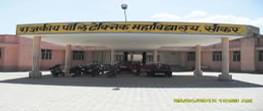Mr. Dileep Kumar Agarwal is an Assistant Professor and the Head of the Department of Computer Science Engineering at the Sobhasaria Group of Institutions. With 16 years of work experience, he has worked at MAIET Jaipur, Shekhawati Engg. College Dundlod and Bhartiya Institute of Engineering and Technology, Sikar. He holds a B.E. and an M.E. degree in Computer Science Engineering from Baldevram Mirdha Institute of Engineering and Technology, and Sobhasaria Engineering College, respectively. Thereafter, he went on to earn a PhD in CSE as well.
Mr. Kumar has attended and organised numerous workshops. He also actively published papers in reputed national and international journals. He has published five papers in his area of expertise.

Being part of management, what is your philosophy of leadership? How would you describe your leadership style?
My philosophy of leadership revolves around being a transformational and ethical leader. As a transformational leader, I strive to inspire and motivate others by sharing a compelling vision and setting a positive example through my own actions. I believe in empowering individuals, encouraging creativity, and fostering a collaborative environment where everyone's strengths are utilised effectively. Additionally, ethical leadership is of utmost importance to me, as I prioritise making decisions and leading with integrity, ethics, and social responsibility. I aim to create a culture of trust, transparency, and accountability, ensuring that ethical principles guide our actions and contribute to the betterment of the organisation and society.
According to you, what makes the education industry the best industry to work in?
The education industry stands out as the best industry to work in due to various factors. Firstly, it offers the opportunity to make a significant impact and engage in meaningful work, shaping the lives and futures of students. Moreover, it provides continuous learning and growth, allowing educators to stay updated with advancements in their field. Building relationships and inspiring students are rewarding aspects that foster personal and professional fulfilment. Additionally, the industry promotes creativity, innovation, and diversity, encouraging collaboration and teamwork. It also offers job security, stability, and a favourable work-life balance. The ever-changing nature of education demands adaptability and innovation, making it an industry that values growth, impact, and personal satisfaction.
Being an integral member of the Institute, how your work impacts the growth of the institute?
As an integral member of the institute, my work impacts its growth in various ways. Through research and innovation, I contribute to the advancement of knowledge and the institution's reputation. Through teaching and education, I play a vital role in shaping the skills and knowledge of students and preparing them for their future careers. Additionally, by providing support and development opportunities to students, I help foster their growth and success. In administration and leadership roles, I contribute to the efficient functioning of the institute, ensuring smooth operations. Developing industry partnerships and collaborations helps create opportunities for students and enhances the institute's reputation. Engaging with alumni strengthens the institute's network and fosters a sense of community. Lastly, active involvement in institutional branding and marketing initiatives helps promote the institute's strengths and attract prospective students and stakeholders. Collectively, these efforts contribute to the overall growth and success of the institute.
How do you introduce practical and industry-oriented approaches towards subjects?
To introduce practical and industry-oriented approaches to subjects, various strategies are employed. These include incorporating case studies and real-world examples into the curriculum, inviting guest lecturers and industry experts to share their insights, assigning industry projects and internships to students, collaborating with industry partners, designing a curriculum driven by industry needs, and conducting practical assignments and lab sessions. We also look into organising industry visits and field trips, facilitating practical workshops and training sessions, and ensuring continuous engagement with the industry to stay updated with the latest trends and practises. These approaches enable students to gain hands-on experience, bridge the gap between theory and practise, and prepare for real-world challenges.
Check SGI Courses & Fees
How do you prepare students to face challenges of modern organizations and global standards successfully?
To prepare students for the challenges of modern organisations and global standards successfully, there are several strategies that should be employed. These include offering a relevant and updated curriculum that aligns with industry demands, providing experiential learning opportunities to apply knowledge in real-world scenarios, fostering collaboration and partnerships with industries, and focusing on the development of soft skills. We also nurture a global perspective and cultural competence, promote technological proficiency, instill ethical and responsible leadership values, and emphasise critical thinking and problem-solving skills.
These approaches equip students with the necessary knowledge, skills, and mindset to navigate the complexities of the modern workplace and meet global standards effectively. To excel in any field of management, students should set clear goals, pursue a relevant degree, gain practical experience, develop soft skills, seek mentorship and networking opportunities, continuously learn, specialise, and build expertise, seek leadership roles, embrace technology and data analytics, and cultivate a professional reputation.
How do you plan on using the immense knowledge and experience you have gained over the decades being an integral member of the institute?
With the immense knowledge and experience I have gained over the decades, I plan to utilise it by providing research assistance to colleagues and students, offering learning support through mentoring and guidance, fostering creative thinking and problem-solving skills, facilitating language learning opportunities, and contributing to professional development initiatives.
What kind of placement and higher studies opportunities your institute provide?
Our institute provides various placement and higher study opportunities for students. For placements, we organise on-campus placement drives, internship programs, career fairs, and establish industry collaborations to connect students with potential employers. Additionally, our strong alumni network offers valuable networking and mentoring opportunities. For higher studies, we offer guidance and support for pursuing advanced degrees and provide resources to explore scholarship and fellowship opportunities. We also organise workshops or sessions on entrance exam preparation for examinations like GATE, GMAT, or TOEFL and provide resources to help students excel in these exams. We also have tie-ups or partnerships with universities or institutions offering postgraduate programmes, facilitating seamless transitions for students.
When you look back on your time in the educational industry, what’s the significant difference?
When I have looked back on the educational industry over time, one significant difference is the increasing integration of technology in education. Advancements in technology have revolutionised the way education is delivered, accessed, and experienced. We now have more digital learning tools, online education, and open educational resources. Technology has influenced pedagogical approaches, moving away from traditional lecture-based instruction towards more interactive, student-centred learning methods. Many institutes have flipped classrooms; and project-based learning, gamification, and online collaborative activities have gained popularity.
Any feedback you would like to share with the new generation coming forward?
To the new generation, I would like to offer some feedback. Embrace lifelong learning, as the world is constantly evolving. Embrace change and cultivate adaptability to thrive in dynamic environments. Pursue your passions and find fulfilment in your chosen path. Prioritise skill development to stay competitive. Seek role models for guidance and inspiration. Embrace technology wisely to enhance productivity. Build strong relationships that foster collaboration and growth. Prioritise your well-being for a balanced and fulfilling life. Lastly, strive to make a positive impact in your community and the world around you.

![Sobhasaria Group Of Institutions - [SGI]](https://image-static.collegedunia.com/public/college_data/images/appImage/1619423847Cover.jpg?h=240&w=1000&mode=crop)
![Sobhasaria Group Of Institutions - [SGI]](https://image-static.collegedunia.com/public/college_data/images/logos/16195170721619423847Logos.png?h=71.7&w=71.7&mode=stretch)
















![Bhartiya Institute of Engineering & Technology - [BIET]](https://image-static.collegedunia.com/public/college_data/images/appImage/13068_BIOFENGI_APP.jpg?h=111.44&w=263&mode=stretch)

![Mody University, School of Engineering And Technology -[SOET]](https://image-static.collegedunia.com/public/college_data/images/appImage/57146_Modyeng.jpg?h=111.44&w=263&mode=stretch)



![Swami Keshwanand Institute of Technical Education-[SKITE]](https://image-static.collegedunia.com/public/college_data/images/appImage/15992994401502.jpg?h=111.44&w=263&mode=stretch)


















.png?h=72&w=72&mode=stretch)
.png?h=72&w=72&mode=stretch)
.png?h=72&w=72&mode=stretch)
.jpeg?h=72&w=72&mode=stretch)


![Mody University, School of Engineering And Technology -[SOET]](https://image-static.collegedunia.com/public/college_data/images/logos/14749550781465293940logo.jpg?h=72&w=72&mode=stretch)





![Stani Memorial College of Engineering & Technology - [SMCET]](https://image-static.collegedunia.com/public/college_data/images/logos/col29498.jpg?h=72&w=72&mode=stretch)
![Bhartiya Institute of Engineering & Technology - [BIET]](https://image-static.collegedunia.com/public/college_data/images/logos/1394602242wq.png?h=72&w=72&mode=stretch)
![Pandit Deendayal Upadhyaya Shekhawati University - [PDUSU]](https://image-static.collegedunia.com/public/college_data/images/logos/1585544203panditlogo.png?h=72&w=72&mode=stretch)
![Gramin Mahila Shikshan Sansthan Samiti - [GMSSS]](https://image-static.collegedunia.com/public/college_data/images/logos/1655192543724logo.png?h=72&w=72&mode=stretch)

![Shree Digamber Institute of Technology - [SDIT]](https://image-static.collegedunia.com/public/college_data/images/logos/1394796551Shree Digamber Institute of Technology (SDIT).png?h=72&w=72&mode=stretch)

![Government Engineering college - [GEC]](https://image-static.collegedunia.com/public/college_data/images/logos/1585569390download.jpg?h=72&w=72&mode=stretch)



Comments